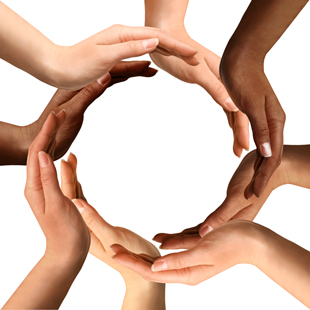Here is a litany of things to do to practice and be reminded of who we are and what we are to do in the world. Some are very specific, some are rather vague, so that it is up to each person, family, and small Christian community and parish in the church to flesh out what it might mean for them and for others.
1. Wash the feet of those who may not walk tomorrow.
2. Stand with the victim, the outsider, the left out, those different.
3. Refuse any sort of violence and refuse to react violently.
4. Resist despair.
5. Scream silently in your prayer; remember the pain of others.
6. Bend the knees of your heart daily in conversion.
7. Learn to kneel and beg on behalf of others' lives and needs.
8. Bear the burden of the cross and seek to share the anguish and pain of others so that the pain stops here.
9. Let the Word of God in the Scripture come true in you daily, weekly, as you pray the readings of Sunday with a small community intent on change.
10. Speak the truth to power and learn to do it in such a way that they can hear.
11. Pray for your enemies and the enemies of your nation and ask forgiveness for them.
12. Absorb the international news and seek out alternative resources that give a more balanced and religious interpretation of events and why they happened.
13. Listen to the local weather reports and what is happening worldwide with the earth and its natural resources and wonder if our bodies and souls are also suffering from extremes of weather.
14. Do not deny reality. Face it down and accept what is wrong with you, the groups you identify with, your economic and racial group, your nation.
15. Support those who resist evil more than you do: prophets, conscientious objectors, peacemakers, and the like.
16. Think universally (the one, holy, catholic, universal church) and act locally and globally, join groups that seek to make peace.
17. Devise new and communal ways of being holy today in this world of violence.
18. Live simply, abhor greed, trust other people, and live a life worthy of mutual trust; share as much as you can, live with as little as you can, and be grateful.
19. End war and talk of war: on drugs, terrorism, refugees, aliens, ethnic groups, preemptive strikes, and so on.
20. Learn a language that is nonviolent. Drop words and concepts that are militaristic, belligerent, aggressive, and disrespectful. If need be, rewrite the media's reporting to reflect the fact that we are all human beings.
21. Treasure the Word of God, the Scriptures, and look to the Gospels for alternatives to what the world and nations say should be our response to any situation. Remember the ground line: we are here to call people forth from their tombs, back from death, and live death-defying lives.
22. Resist sin with all your heart and soul and mind and strength (resources).
23. Act with others as much as you can.
24. Clutch and hold onto those near you; make families and relationships stronger than blood ties — ties that are based on water (baptism), bread and wine (the body and blood of Christ) and the cross, all those who suffer as Christ waiting to be taken down from the cross.
25. If you feel like you can't do anything, stand there, pray and resist with your soul force.
26. Live with invincible gentleness.
27. Forgive all, everyone, everything, and ask for it, bend and offer it graciously; learn the art.
28. Reconcile; walk with others as you follow the way of the cross to glory.
29. Remember to dance resurrection in the face of death.
30. Pray as though everything depended on God and work as though everything depended on you (it does) (the words of John of the Cross or Teresa of Avila; they were such good friends, even their words belonged to each other).
31. Learn the basics of another religion and practice some of its prayer and disciplines to better understand others, especially Islam and its mystical traditions.
32. Learn another language, if only a few words, such as "peace be with you," "hello," "thank you," "what is your name?" Learn especially languages of those labeled enemies: Iraq, Iran, the Palestinians, Afghans, Saudis, Egyptians.
33. Tell stories of hope, of resurrection and new life, of justice and peace, and refuse to be caught in the trap of name calling or demeaning others.
34. Think in terms of us and we, and drop the ideas and phrases that prolong the dichotomy of us and them.
35. Practice kissing fists, opening hands, and bowing to all others profoundly.
